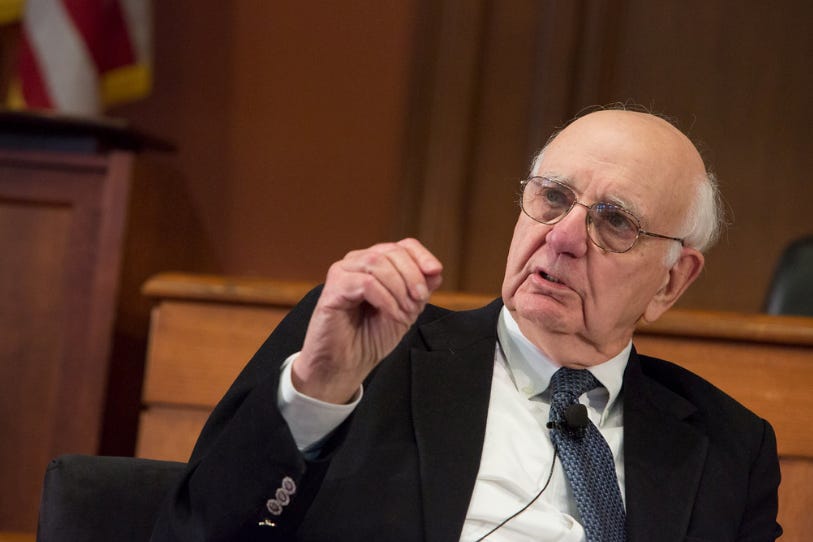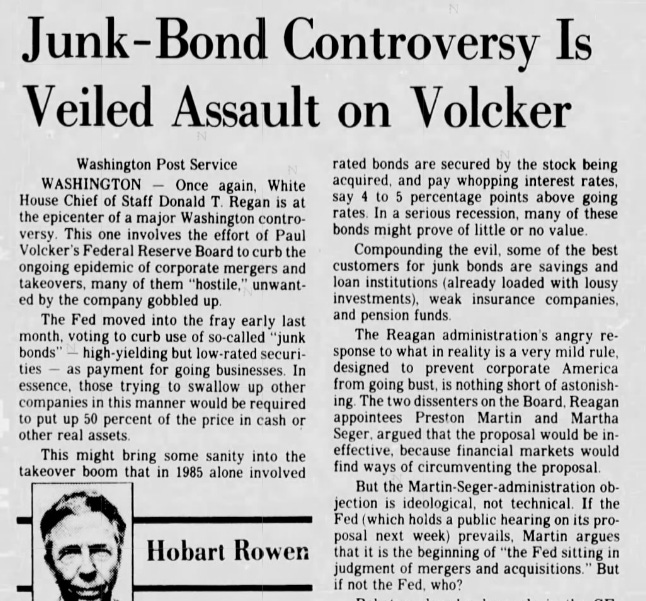On the Tragedy of Paul Volcker
Hi,
Welcome to BIG, a newsletter about the politics of monopoly. If you’d like to sign up, you can do so here. Or just read on…
Today I’m going to do a quick recap of Paul Volcker’s life. Volcker, who died yesterday, was one of the most important men in finance in the last fifty years.
Volcker was an honest man, in many ways a great man, but one whose actions nonetheless helped shatter the American middle class. This wasn’t his intent, but it was what he accidentally wrought. Volcker’s life is a tragedy, not for him, but for the rest of us.

This picture is from the Edmond J. Safra Center for Ethics at Harvard.
The Volcker Rule
In 2009, when the world was falling apart, a lot of people were asking new President Barack Obama to turn to Paul Volcker, the tall and prestigious former central banker whose reputation was of near God-like stature. Obama did, asking Volcker for advice. But Larry Summers, key advisor to Obama, sabotaged the relationship. Volcker encouraged Obama to stop banks from gambling with internal hedge funds, but Summers wanted banks to keep gambling with internal hedge funds. Summers won the bureaucratic fight.
Volcker’s titanic reputation was by then decades old. But so too was Volcker pursuing honesty in finance, and getting pushed out because of it. In 1986, Ronald Reagan essentially fired Volcker from his position as the head of the Federal Reserve because Paul Volcker was trying to crack down on the junk-bond fueled mergers craze that was clearly corrupting America’s savings and loan banks. Felix Rohatyn, a Democratic fixer and Lazard investment banker, pleaded with the Republicans, “if we sacrifice Paul Volcker for the junk-bond mania, we will clearly show the world that we’ve lost any sense of financial responsibility.”
Here’s a story from 1986, at the height of the frenzy.

Volcker lost the battle at the Fed, and ultimately Alan Greenspan, who was on the payroll of one of the largest corrupt savings and loan banks, took over. Volcker, in pursuing financial rectitude, had no allies except the ‘respect’ of the financial world, which, as it turns out, isn’t worth much at all. And the reason, ironically, is because Volcker killed his greatest would-be allies.
I first ran into Volcker’s career while researching Penn Central, the train system that went bankrupt in 1970 in the greatest then-collapse in American history. It was like the Enron of its time. The Nixon administration tasked the conservative Volcker with overseeing the fiasco, and he was a fairly honest broker. He tried, not very hard, to get a bailout, but when Congressman Wright Patman said no, that was that.
In 1979 Jimmy Carter nominated Volcker to be the head of the Fed. Carter's advisor warned him that Volcker was the "candidate of Wall Street." In an era of red-hot inflation, Volcker's goal was to cut the growth of prices, with the ultimate end of keeping the dollar strong globally. He had popular backing, Americans saw inflation as the most pressing economic problem. Volcker went straight at the auto sector, the unionized pace setting industry which set the informal wage growth patterns of the entire country since the 1950s.
His goal was to crush wages, straight out. To give you a sense of how strongly he felt about this goal, consider that during this period, from the late 1970s to the mid-1980s, Volcker walked around with a card of union wages in his pocket to remind himself that his goal was to crush the middle class. Volcker even angered Reagan officials by keeping interest rates too high for too long. When they complained, he would pull “out his card on union wages” and note that inflation would not come down permanently until labor “got the message and surrendered.” Volcker said that the prosperity of the 1950s and 1960s was a "hall of mirrors" and that the "standard of living of the average American must decline."
Volcker was a deeply conservative, but not corrupt, official. I think the speech that best exemplifies how he thought was one he gave in 1981 before the Economic Club of New York, lauding the bankruptcy and turnaround of the city.
Five years ago, when I last addressed the Economic Club, the preoccupation of the day was the acute financial distress of this great City and State. That big black headline in the Daily News—"Ford to New York: Drop Dead"—was not quite accurate. But in its bold and brazen way, it did carry an essential message. Any lasting solution to our economic problems would have to begin, and end at home.
A month or so ago, I was struck by another headline, this time in a Wall Street Journal editorial: "The Supply Side Saves New York." Somehow, in five years, New York had become an example for the rest of the country to follow.”
Volcker, in other words, was an ardent fan of austerity. And in his speech, he explicitly noted that New York City had no printing press to get out of the fiscal jam it had been in. That was, as Volcker put it, “fortunate.” Instead, the city had to slash expenditures, particularly on the poor. Volcker hoped that the America would take this lesson to heart nationally, and since he ran the printing press, that’s what he made sure happened. He also believed strongly in slashing taxes, government spending, and in deregulation, as he said to businessmen in Kansas City that year.
Volcker raised interest rates radically, crushing small businesses, farms, banks, and credit unions. To many of his fans, and even his opponents, this was simply what had to be done to get inflation out of the system. But there was a brief experiment, if forgotten, experiment in trying a different path, In the spring of 1980, Jimmy Carter encouraged Volcker not to raise interest rates, but to place “credit controls” onto consumer borrowing. Credit controls are direct public rules on specific lending institutions that make it more or less expensive to lend or borrow, and were a major mechanism to keep inflation out of the system during World War Two and the Korean War. And the Fed had the authority to make it more expensive for banks and financial institutions to issue credit cards and lend money to consumers.
Volcker used these tools incredibly poor, clumsily even, with some suspecting he was intending to sabotage the use of regulatory tools he didn’t like. Inflation collapsed, as did interest rates and the economy slid rapidly. Within a few months, Volcker and the bankers got rid of credit controls. Inflation and interest rates jumped right back up, and Volcker was able to discredit credit controls. He then inflicted massive pain on the middle class instead of the banking system by using interest rates and monetary policy, instead of explicitly telling big banks to stop lending.
At the same time as Volcker was destroying unions, small banks, small farms, and small businesses, he was structuring the Too Big to Fail model of finance. In 1980, Nelson and Bunker Hunt, two oil billionaire heirs, tried to corner the silver market in league with Arab interests. Volcker organized a bailout. By 1980, Wall Street had gotten the message. Economist Albert Wojnilower explained, “It is now everywhere taken for granted that no monetary authority will allow any key financial actor to fail."
In the middle of the 1980s, Volcker’s strategy looked like a success. Inflation was gone, the economy was growing, technology seemed to be restructuring society, and the workforce had largely been de-unionized. But there was a something of a mirage, as a bubble in financial leverage through savings and loan banks and junk bonds emerged. Volcker tried to crack down on this bubble, to block the use of junk bonds for certain kinds of seedy transactions. He knew a scumbag when he saw one, and the junk bond peddlers and M&A artists were scum. But by then, his allies against financial corruption, notably the small banks, small business, and unions, were dead or dying. So it was Paul Volcker and all his vaunted respect, versus an army on Wall Street.
There was no contest. The predatory bankers won, as they did again in 2009.
Towards the end of his life, Volcker railed against the corruption he saw everywhere. But he never connected the dots between his own actions destroying public institutions and the inability to constrain the financial corruption he despised. Many people in finance have fond memories of an incorruptible Paul Volcker standing up against financial corruption and reigning in inflation. Which is true. But Volcker really wasn't on the side of democracy, and that's why he oversaw nothing but decline.
I ran into Paul Volcker a few years ago at a conference when I was a Democratic Congressional staffer. He harangued me and said 'why are you Democrats so weak?' I wish I had responded, 'because you killed the unions.'
And that is the tragedy of Paul Volcker.
Thanks for reading. And if you liked this essay, you can sign up here for more issues of BIG, a newsletter on how to restore fair commerce, innovation and democracy.
Matt Stoller
P.S. It’s short notice, but I’ll be giving a book talk today at 5pm on the impeachment of Andrew Mellon.
Public Citizen
1600 20th St., NW, Washington, DC 20009
Please RSVP to Aileen Walsh at awalsh@citizen.org.

